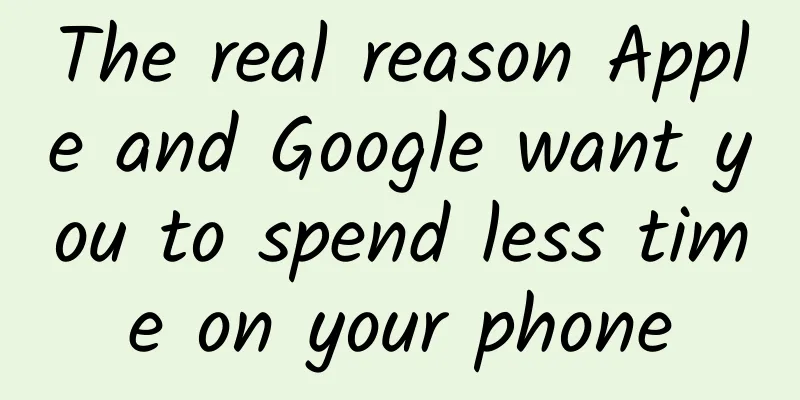The real reason Apple and Google want you to spend less time on your phone

|
This month, Apple released "Screen time" to help people understand how much time they spend on different apps, so as to help people reduce the use of smart devices. Previously, Google also had similar features such as "Dashboard", "Shush" and "App Timers". It seems that overnight, the whole world is advising you to play less with your phone. Why would the companies that make your phone want you to use it less? Why are these companies now going against their own interests, as some tech critics have suggested? Do they really mean so well? Have the tech giants realized their mistakes, or are they being forced to make these changes by public pressure? Of course not. According to Nir, a blogger at Quartz, who has studied the complex psychology of how these companies operate, at first glance, their business model appears to be addictive. The more you use your phone, the more money they make from the apps you buy and the ads you view. However, these moves to get you to use your phone less are not surprising given the long-term interests of these companies. Apple and Google are getting consumers to use their phones less because it is in their long-term interest. Apple and Google don’t want you to get addicted. Addiction is a compulsive, harmful behavior. Instead, they prefer you to form healthy habits with your digital devices. Image from Xinhua Daily An interesting example is that in 1968, the federal government required all cars to be equipped with seat belts. However, American automakers had already been offering seat belts in their cars for 19 years before the requirement was introduced because consumers wanted them. Selling safer cars would increase manufacturers' sales. Likewise, third-party apps are helping users monitor how much time they spend online, reducing distractions by visiting certain sites less often. This is very similar to recent announcements from Apple and Google. Nir started writing about this emerging trend, calling it “attention retention” devices. There are more digital health products out there now than ever before. For example, the app Seven, which became famous for its 7-minute workouts. Image from MIUI forum When a product is harmful to people, consumers tend to use it less or find better alternatives. The two tech rivals' moves to help users use their devices less and develop healthy habits are actually making their products more competitive. The harsh reality is that they may not care about your health, they just don't want their competitors to attract you through health. Although their designed functions are indeed great and they are good for users, we should not become slaves to technology. Instead of waiting for technology companies to take measures to prevent users from overusing devices, we should take the initiative to reduce the use of devices and do more meaningful things in life. |
<<: Give technical staff some non-technical advice
>>: Google introduces new biometric authentication API for Android P
Recommend
Is Google's return to China a pipe dream or a comeback?
On October 20, American Internet giant Google ann...
For a product with 100,000 users, how should user activation be carried out?
For user operations personnel, if the product has...
Foxconn Chairman: Mass production of electric vehicles in the United States in 2023, transition to high-tech products
Foxconn's parent company, Hon Hai Group, rece...
"Practical Course on Creating Accounts for Live Streaming on Douyin for Physical Stores" has five core sections from zero cognition to actual practice
Training course video content introduction: The f...
There is a magical flower hidden in your favorite beer
"Grind the malt into the wine vat, saccharif...
This article will show you the magical ocean temperature difference power generation
The ocean is the world's largest solar collec...
Apple plans to launch a new energy vehicle in 2024, which will use "breakthrough" self-developed battery technology
As new energy vehicle companies have dominated th...
Can you reach this pace? Diabetes risk may be reduced by 39% →
Compiled by: Gong Zixin Type 2 diabetes is a prog...
One article makes it clear: Xiaohongshu bloggers should not sign contracts with MCN!
With the rapid development of content industries ...
How to write high-quality creatives in Baidu bidding promotion?
How to write high-quality creative ideas in Baidu...
Level 3 emergency response initiated! Heavy rain + thunderstorm + strong wind! These areas should be on guard →
The Central Meteorological Observatory continued ...
5 mainstream ways to play Tik Tok live streaming!
In fact, we have talked a lot about live streamin...
How to revive an old Douyin account? What issues should you pay attention to?
Every day, many Douyin video users register new a...
Why is AIDS so difficult to treat? How significant is it that a female AIDS survivor has emerged?
In our understanding, AIDS is difficult to cure. ...
Suddenly, WeChat suspended account registration. This is what happened.
Today's WeChat is no longer the simple chat s...









